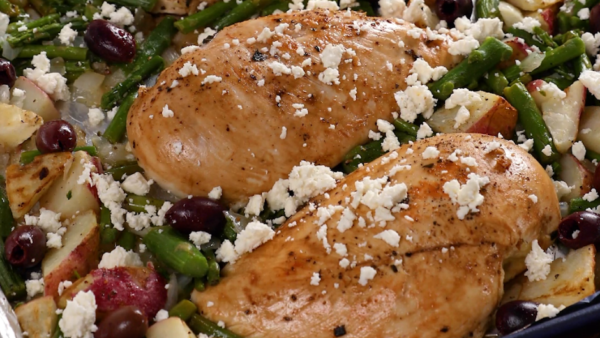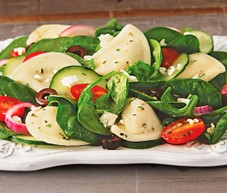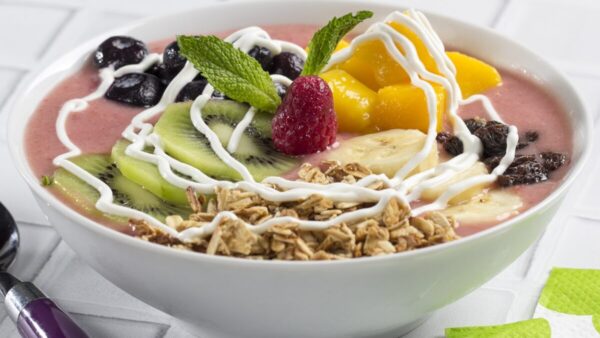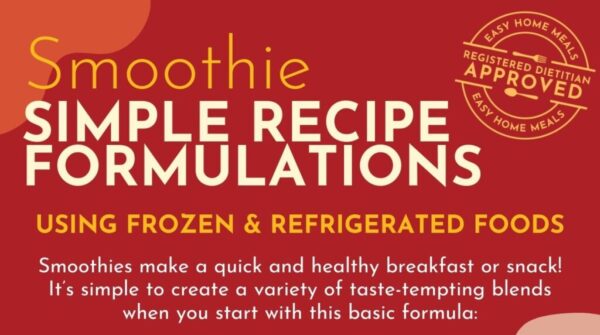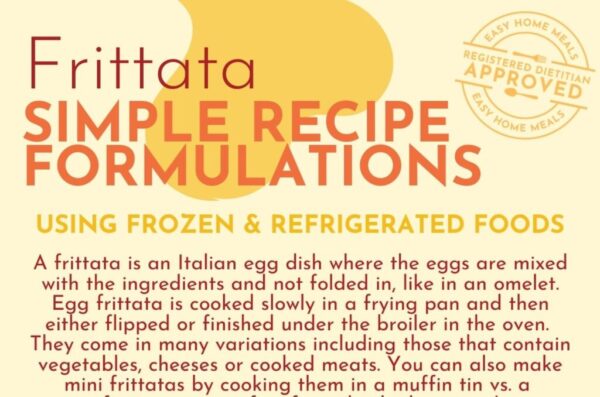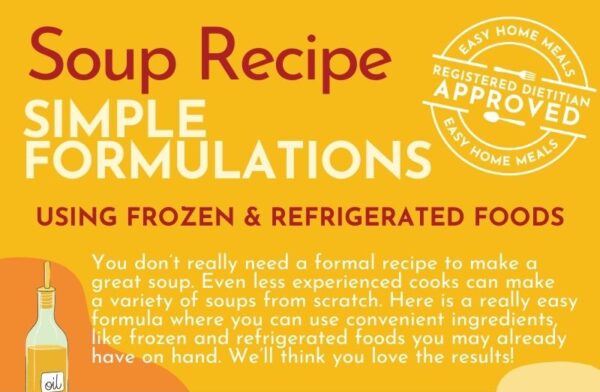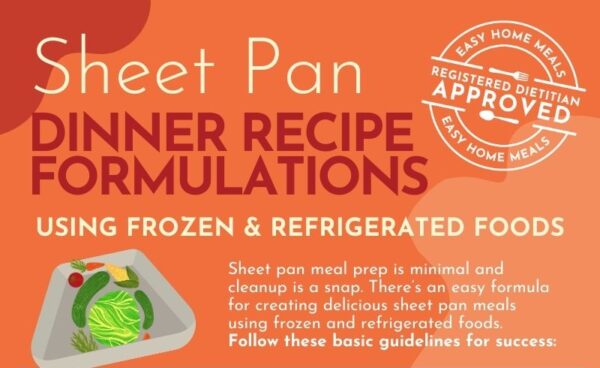December 19, 2024
New Year, New Habits: A Plan for Healthy Eating All Year Long

As the new year approaches, it’s an ideal time to set intentions for healthier eating habits that nourish both body and mind. Rather than focusing on unrealistic, restrictive diets, set goals to incorporate more fruits and vegetables, lean proteins, whole grains and probiotics into everyday meals. Small, sustainable changes — like cooking more at home, practicing mindful eating, staying hydrated, and stocking your kitchen with nutrient-rich, convenient food products— can make it easy to stick to your goals. ReDiscover how frozen and refrigerated dairy foods make it easy and convenient to embrace a balanced approach to nutrition that can lead to increased energy, improved mood, and better overall well-being.
High-Quality Protein
Including high-quality protein in meals can be particularly beneficial for weight management, as protein helps you feel fuller for longer, potentially reducing the urge to snack or overeat. In addition, protein is vital for supporting muscle maintenance, growth, and strength which is especially important as we age or engage in physical activity.
Protein Pointers:
- Make your stir-fry with with higher protein frozen veggies like edamame or peas, and top with a high-protein sauce like peanut sauce or a yogurt-based dressing.
- Keep a variety of frozen meats and seafood on hand and add them to stews, pasta dishes, and salads for easy meals.
- Use Greek yogurt as a base for dressings, dips, or as a topping for tacos and baked potatoes.
- Add shredded cheese to meals like casseroles, pasta, and
- Look for frozen high-protein waffles, breakfast burritos, and mini egg frittatas.
Nutrient-Rich Fruits and Veggies
Fruits and vegetables offer a wide varietyof health benefits due to their rich nutrient profiles, including essential vitamins, minerals, fiber, and antioxidants. Studies show frozen vegetables retain nutrients equal to or better than fresh produce, as they’re frozen at peak ripeness. Eating a diet rich in fruits and vegetables can help reduce the risk of many chronic diseases, including heart disease, stroke, diabetes, and certain cancers.
More Matters: Using frozen fruits and vegetables is an easy and affordable way to get more produce into your diet. Here are some creative and practical tips for incorporating frozen fruits and veggies into meals.
- Add frozen berries, mango, spinach, caarrots, or kale to smoothies
- Include frozen vegetables like carrots, peas, green beans, corn, and spinach to soups, stews, and chilis
- Steam or sauté frozen veggies like broccoli, carrots, or cauliflower, then toss with grains, a protein, and a dressing
- Add thawed or cooked frozen veggies like spinach, bell peppers, or onions to omelettes, frittatas, or scrambled eggs
- Add frozen berries, peaches, or cherries to yogurt, oatmeal, or cereal
Powerful Probiotics
Probiotics are beneficial bacteria that play a critical role in supporting our digestive and overall health. Foods like yogurt and kefir contain probiotics, which can help improve digestion and support gut health — important for nutrient absorption and immunity.
Probiotic-Rich Dairy: Incorporating probiotics through dairy foods is easy and delicious! Here are some simple tips for adding more probiotic-rich dairy into your meals:
- Use plain Greek or regular yogurt as a base for breakfast bowls. Add frozen fruit, nuts, and seeds.
- Blend yogurt or kefir into smoothies with frozen fruit, spinach, and a handful of oats.
- Cottage cheese pairs well with veggies like cherry tomatoes, cucumbers, and avocado for a savory snack or light meal.
- Some cheeses, like Gouda, Swiss, and aged cheddar contain probiotics. Look for raw, aged cheeses to get the most benefit. Add to sandwiches, salads, or as a protein addition to snacks.
- Use Greek yogurt as a base for dips like ranch, spinach, or artichoke dip.
- Skyr is an Icelandic dairy product similar to Greek yogurt but even thicker. It’s rich in protein and probiotics.
Meal Planning Made Easy
In addition to these nutritional benefits, frozen and dairy foods can be excellent tools for portion control, helping you manage your intake while enjoying nutritious and satisfying meals. Certain frozen meals, like balanced entrees with veggies and lean proteins, are portioned out to meet daily dietary guidelines. Stocking up on single-serve portions of dairy, such as cheese sticks, yogurt cups or cottage cheese containers, and frozen yogurt bars, Greek yogurt ice cream, and portion-sized containers of ice cream also offer a controlled way to enjoy dessert.
Sustainability Spotlight
Choosing frozen foods helps reduce food waste while ensuring year-round access to seasonal produce. Frozen fruits and vegetables are harvested at peak ripeness and flash-frozen to lock in nutrients, reducing the environmental impact of food spoilage and long-distance transportation of fresh produce.
Smart Savings for Savvy Shoppers
Stock up during frozen food sales to maximize your grocery budget. A well-stocked freezer can reduce takeout expenses and minimize food waste. Buy frozen produce in bulk during peak season for year-round savings. Pro tip: Compare cost per serving between fresh and frozen – you’ll often find frozen options more economical, especially for out-of-season produce.
There are so many tasty ways to assemble your favorite frozen and dairy foods into nutrient-packed meals to help you meet your health goals!
Breakfast:
- Almond Milk Smoothie Bowl – Feel Good Smoothie Bowl
- Lender’s Toasted Bagel + Yogurt Based Smoothie – Frosty Peach & Pear Smoothie
- Garden Lites Vegetarian Spinach & Egg White Frittata + Bay’s Multi-Grain English Muffin + Tropicana Orange Juice
Lunch:
- Greektown Pierogy Salad + Frozen Mixed Fruit
- Cheesy Roast Beef Wraps + Fresh Fruit + Frozen Yogurt Bar
- Healthy Choice Individual Frozen Meal + Glass of Low Fat Milk
Dinner:
- Easy Chicken Fried Rice Soup + Frozen Prepared Whole Grain Dinner Rolls
- Sheet-Pan Greek Style Chicken with Roasted Vegetables + Frozen Fruit Bars
- Frozen Family Lasagna + Frozen Whole Green Beans + Garlic Bread
Here’s to a new year filled with nutritious choices and a mindful approach to eating! Find recipe inspiration here for a healthy, happy new year.

About the Author: Shari Steinbach, MS RDN
Shari is a nationally recognized food and nutrition consultant with over 25 years of experience as a health professional with two major supermarket chains in the Midwest. She specializes in crafting unique programs for her clients that provide meaningful nutrition and meal planning solutions for today’s consumers. Shari holds a Bachelor of Science Degree in Dietetics from Central Michigan University and a Master of Science Degree in Human Nutrition from Andrews University in Michigan.

